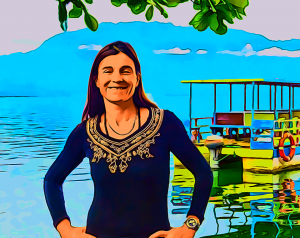181 Letter from Sylvine Pickel-Chevalier

Dear ladies, young researchers or students who want to become researchers
My message is this: trust in your dreams! Never give up your goals, and face them bravely. My desire to become a researcher emerged when I was only 14 years old, which was when I resolved that I would dedicate my whole life to my passion for learning, teaching and writing. It has been a long and arduous road, but each step taken has been filled with rich and fascinating discoveries. Not all of them have necessarily been positive, yet the challenges have been consistently constructive, as we always construct ourselves through mistakes and failures, as well as through our successes.
In my view, the key to success is hard work, perseverance and the willingness to take chances. Chance, in turn, also lies in encounters with people who trust in you and assist you. I have had this privilege. Devoted to my work, I met on many an occasion people who believed in me. The first one was Rémy Knafou, who agreed to supervise my PhD research. He was followed by Philippe Violier, director of the faculty of Tourism and Hospitality, where I have now been working for 16 years. Dr. Violier has not only supported my projects, but it was he who initially incited me to open new fields of research, by sending me both to Indonesia and out into the equine sector. Learning of my passion for horses and perceiving opportunities that could be mobilized at the university, where there was already a program in equine business management, he encouraged me to plunge more deeply into analysis, through geographical approaches, to the evolution of horse-human relations, as well as tourism’s capacity to favour the emergence of new equine economies and territorial development.
Although misogyny still exists in France and the World, many men also recognize the value of gender equality. Thus, I today enjoy men colleagues from several countries – and notably, from Indonesia who, despite cultural differences, consider me their equal. I believe that through our work we women have been able to demonstrate the equality of our intellectual capacity and performance. The world is changing. Sometimes changes are slow, and prejudices remain tenacious, but I am convinced that gender equality will continue to advance. For example, I currently take part in a webseminar on Gender in Indonesia, followed on line by almost 400 Indonesian students. This year, my faculty co-organised a symposium on Tourism and Gender in Morocco that got important support from Moroccan researchers, students and officials, female and male.
Furthermore, professional life is increasingly compatible with family life. In my case, I am married, have two lovely daughters, and in addition to my home and work life, am also able to continue to enjoy sports and riding horses. Of course, this demands considerable coordination of home and work tasks within the family. I am certain that at this level, as well, gender equality is on the rise, and hope that it soon becomes the norm.
Thus, if studying, writing, teaching, and communicating are your “way of life”, I recommend you “hang on”, and also that you seek out new or different subjects that favour your own identification within the scientific community. A further piece of advice is to also, always be open to the diversity of the world. Never rely on your own prejudices; maintain a willingness to confront your own hypotheses or the preconceived notions that you take out into the field with you. International collaborations represent a constant source of both professional and personal enrichment. This often includes the use of English as lingua franca, in order to promote communication and exchange within a worldwide scientific community.
Good luck to all of you, as you sculpt you own stepping- stones to a better world, a better tomorrow!
Sylvine Pickel
Université d’Angers, France


